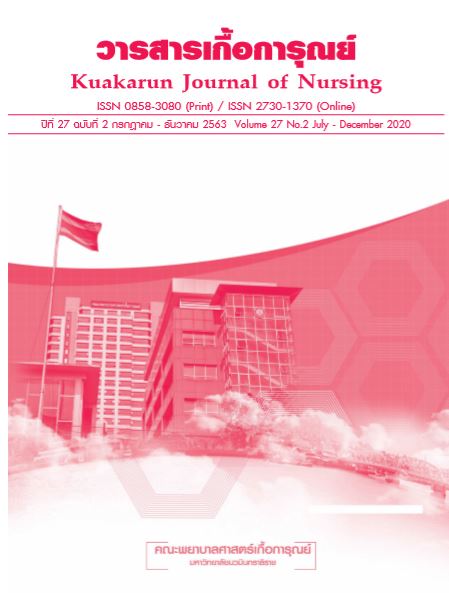ปัจจัยทำนายความร่วมมือในการรับประทานยาของผู้ป่วยโรคหลอดเลือดสมองตีบ
คำสำคัญ:
ความร่วมมือในการรับประทานยา, โรคหลอดเลือดสมองตีบบทคัดย่อ
การวิจัยแบบบรรยายเชิงทำนายนี้มีวัตถุประสงค์ เพื่อศึกษาความร่วมมือในการรับประทานยาของผู้ป่วยโรคหลอดเลือดสมองตีบ และศึกษาปัจจัยทำนายความร่วมมือในการรับประทานยาของผู้ป่วยโรคหลอดเลือดสมองตีบ จากปัจจัยด้าน อายุ ความเชื่อเกี่ยวกับความจำเป็นของยา ความกังวลเกี่ยวกับยา การรับรู้ความรุนแรงของโรค ความรู้ ภาวะซึมเศร้า และสัมพันธภาพกับแพทย์หรือพยาบาล กลุ่มตัวอย่าง คือ ผู้ป่วยที่ได้รับการวินิจฉับว่าเป็นโรคหลอดเลือดสมองตีบอย่างน้อย 3 เดือน ที่มารับบริการที่คลินิกโรคหลอดเลือดสมองในโรงพยาบาลราชวิถี และสถาบันประสาทวิทยา รวม 130 คน คัดเลือกกลุ่มตัวอย่างด้วยวิธีการสุ่มแบบง่าย เก็บข้อมูลโดยใช้แบบสอบถาม 8 ส่วน ได้แก่ 1) แบบสอบถามข้อมูลส่วนบุคคล 2) แบบบันทึกข้อมูลทางด้านสุขภาพ 3) แบบสอบถามความเชื่อเกี่ยวกับยา 4) แบบสอบถามความรู้เกี่ยวกับโรคหลอดเลือดสมอง 5) แบบสอบถามการรับรู้ความรุนแรงของโรคหลอดเลือดสมอง 6) แบบประเมินสัมพันธภาพระหว่างผู้ป่วยกับแพทย์หรือพยาบาล 7) แบบประเมินภาวะซึมเศร้า และ 8) แบบสอบถามความร่วมมือในการรับประทานยา ตรวจสอบความตรงตามเนื้อหาโดยผู้ทรงคุณวุฒิ 5 คน มีดัชนีความตรงตามเนื้อหา เท่ากับ .80, 1.00, 1.00, 1.00, 1.00 และ 1.00 ตามลำดับ ส่วนที่ 3, 5, 6, 7 และ 8 มีค่าความสอดคล้องภายในจากการคำนวณค่าสัมประสิทธิ์อัลฟาครอนบาค เท่ากับ .78, .87, .78, .83 และ .74 ตามลำดับ ส่วนที่ 4 มีค่าความเชื่อมั่นเท่ากับ .74 วิเคราะห์ข้อมูลโดยใช้สถิติวิเคราะห์ถดถอดพหุคูณแบบขั้นตอน
ผลการวิจัย พบว่า 1) ผู้ป่วยโรคหลอดเลือดสมองตีบ ร้อยละ 35.38 มีความร่วมมือในการรับประทานยา 2) ปัจจัยทำนายความร่วมมือในการรับประทานยา ประกอบด้วย 4 ตัวแปร ได้แก่ การรับรู้ความรุนแรงของโรค ความรู้ ภาวะซึมเศร้า และความเชื่อเกี่ยวกับความจำเป็นของยา โดยสามารถร่วมกันทำนายความร่วมมือในการรับประทานยาของผู้ป่วยโรคหลอดเลือดสมองตีบได้ร้อยละ 46.30 (Adjusted R2 = .46) อย่างมีนัยสำคัญทางสถิติที่ระดับ .05 สำหรับปัจจัย อายุ สัมพันธภาพระหว่างผู้ป่วยกับแพทย์หรือพยาบาล และความกังวลเกี่ยวกับยา ไม่สามารถทำนายความร่วมมือในการรับประทานยาได้ ข้อเสนอแนะคือใช้ข้อมูลเป็นแนวทางในการส่งเสริมให้ผู้ป่วยโรคหลอดเลือดสมองมีความร่วมมือในการรับประทานยา โดยมุ่งเน้นการรับรู้ความรุนแรงของโรคหลอดเลือดสมองตีบ
เอกสารอ้างอิง
World Stroke Organization: WSO (2019). World stroke campaign database onthe [Internet]. 2019 [cited 2019 Jul 7]. Available from: http://www.worldstrokecampaign.org/
Phanwung N, Yu-leislob A, Ceapor A. Campaign substance paralysis issue 2018 [Internet]. 2018 [cited 2019 Jul 7]. Available from: https://ddc.moph.go.th/uploads/files/78a5b91d92a079c1a3 5867c6347a9299.pdf (in Thai)
Nualnetr N. Physical therapists and stroke in the community. North-Eastern Thai Journal of Neuroscience 2011;6(3):45-9. (in Thai)
Suwanno JO, Suwanno JU, Angkol K, Radboriruk K. Cardiovascular risk factors in young adult patients with acute ischemic stroke. Journal of Thai Stroke Society 2018;17(1):5-16. (in Thai)
Tippayanate N, Chanabutr W. Knowledge of stroke risk factors and warning signs: a case study of the stroke education program in Mahasarakham factory [Internet]. 2018 [cited 2018 Jan 2]. Available from: https://www.niems.go.th/1/Ebook/Detail/1052?group=29 (in Thai)
Thungpho P. Prevention of recurrent stroke in the elderly. North-Eastern Thai Journal of Neuroscience 2018;13(2):56-67. (in Thai)
Theiymkeao S. Recurrent ischemic stroke in Srinagarind Hospital. North-Eastern Thai Journal of Neuroscience 2009;3(1):31-8. (in Thai)
Horne R, Weinmam J. Pateints’beliefs about prescribed medicines and their role in adhereance to treatment in chronic physical illness. Journal of Pyschosomatic Research 1998;47(6):555-67.
Sadoyoo S, Jirapreeya N, Treesak C, Sangjam P. Leftover medications in patients with chronic diseases from home health care visits: a community study in Bangkok. Dialogue on Pharmacy and Health Care Practice 2014;1(1):1-7. (in Thai)
World Health Organization: WHO. Adherence to long-term therapies evidence for action [Internet]. 2016 [cited 2016 Dec 27]. Available from: https://www.who.int/chp/knowledge/publications/adherence_full_report.pdf
Sangsongrit N. Predictors of medication adherence in ischemic stroke patients [Dissertation]. Bankok: Mahidol University; 2017. (in Thai)
Horne R, Weinmam J, Hankins M. The beliefs about medicines questionnaire: the development and evaluation of a new method for assessing the cogitive representation of medication. Psychology & Health 1999;14(1):1-24.
Rujisathiyn N. The relationship between perception of illness and beliefs about medicine. Consistency in taking glucose lowering drugs in patients with type 2 diabetes mellitus [Dissertation]. Bankok: Mahidol University; 2009. (in Thai)
Jannoy R. Factors related to health behaviors for the prevention of stroke in Phetchabun Province [Dissertation]. Bankok: Mahidol University; 2012. (in Thai)
Kittiwongin P. Factors predicting drug use behavior according to the treatment criteria of schizophrenic patients using substance abuse [Dissertation]. Bankok: Chulalongkorn University; 2013. (in Thai)
Kanjanarak U. Predicting factors of drug use behavior according to the treatment criteria of schizophrenic patients in the community [Dissertation]. Bankok: Chulalongkorn University; 2002. (in Thai)
Department of Mental Health. (2015) Guideline for using mental healyh for medical personnel. Guidelines for using mental health tools for public health personnel in community hospitals. (Chronic Disease Clinic) Revised version. Nonthaburi: Printing house, Agricultural Cooperative of Thailand Limited; 2015. (in Thai)

















